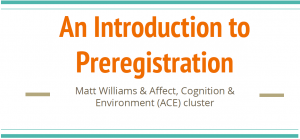Introduction to Preregistration
July 31, 2019
Earlier today, Matt Williams delivered a seminar on preregistration to members of the School of Psychology at Massey University.
The abstract is below, and the slides can be found here.

Abstract: Preregistration is a research strategy that is of increasing importance in confirmatory (hypothesis-testing) research (see Nosek et al., 2018). Preregistering a study means lodging a detailed plan for collecting and analysing the data prior to actually collecting the data. Preregistrations are stored in online databases where they are frozen and timestamped at the time of submission. Preregistration is a partial solution to the problem of “researcher degrees of freedom” (Simmons et al., 2011): By committing to a specific plan for a study, we limit our capacity to run several different versions of the data analyses until we find “positive” results. However, preregistration has several other important research and pedagogical benefits, and can be useful for academics and postgraduate research students alike. In this seminar we will discuss the rationale for preregistration, highlight some of its pedagogical and research benefits, address some common myths about preregistration, and discuss some of the challenges of implementing preregistrations in practice. We expect that this presentation will be particularly relevant to members of the school who engage in or supervise quantitative research that involves the testing of hypotheses, though we hope that it will be interesting for all.

Leave a Reply